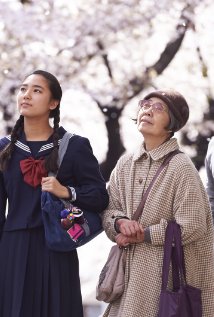
AN
Japan, 2015, 113 minutes, Colour.
Kirin Kiki, Masatoshi Nagase, Kyara, Uchida.
Directed by Naomi Kawase.
A Japanese story in the tradition of such film directors as Ozu and his portraits of ordinary people in their ordinary lives. it was through three seasons, Spring with the cherry blossoms, Summer with the greenery, Autumn leaves falling.
The setting is a shop which makes pancakes, buying in ingredients, An and beans, in bulk, and making pancakes continually, the proprietor, Sentaro, being something of a perfectionist and discarding his failures, picked up by young school girl who is in need.
One day, a well-dressed and fine-mannered old lady,Tokue, comes to visit the shop, hesitant at first, observing, and then asking for a job, pleading, bargaining about wages, and finally bringing a container with her own bean paste which the proprietor puts aside, then decides to taste it – and finds that it is wonderful. He welcomes the old lady and they begin to make the bean paste, she bringing a recipe very different from his own, and they patiently spend time, slowly, boiling the beans, straining the water, cleansing them, and making the paste.
When some of the customers, especially a group of schoolgirls who are constant patrons of the shop, taste the new pancakes and the bean paste, word gets around and there are more customers than they can deal with, even the schoolgirl joining in the work.
This part of the film has a great deal of joy. but, sadness is to come, especially when customers discover that Tokue has been a victim of leprosy. The proprietor is sad, the schoolgirl blames herself for telling her mother about the leprosy.
But the sadness is quite gentle, the proprietor and the schoolgirl going to visit the old lady in her residence, finding her resigned, looked after by a friend. It is only now that the past story of the proprietor and his hard times is heard – especially when the owner of the shop turns up, and he is indebted to her, and she wants to employ a friend and to renovate.
There is also the sadness and death – but the film is one of fulfilling one’s life, no matter what the obstacles, always living in hope and dying in peace.
A pleasing film of delicate sensitivity.
1. A pleasing film? Style? Or people, the humane presentation, joy and sadness?
2. The work of the director, her status in Japanese cinema?
3. The city, the streets, the shop, home? An authentic feel? Musical score?
4. Visuals of the seasons, spring and the cherry blossom (and the blossoms falling, sense of death)? Summer, greenery? Autumn and the falling leaves?
5. The title, food film, making the pancakes, buying in bulk, bean paste and making it?
6. The focus on Sentaro, his age, his work, the details of making the pancakes, meticulous? The schoolgirls, the customers, the schoolgirls sitting, enjoying the pancakes? His diligence? Wakama and her visits?
7. Tokue, dress, manner, aged 76, observing, asking for a job, his refusal, talking, leaving bean paste and his tasting it? His buying in bulk, the decision to make the bean paste, buying the beans, the recipe, the boiling, the straining, washing, slow progress, tasting, the success?
8. The crowds, the appreciation? The news that Tokue was a leper? Her reputation, stopping working, her taking time off?
9. Wakama, work, school, her mother against schooling, needing money? Her running away, telling her mother about Tokue and the leprosy? Blaming herself for the rumour? Telling Sentaro?
10. The owner of the shop, with the young man in tow, wanting to work there, the decision to renovate?
11. The leper story, fingers and noses, the results, people’s fears – and the changing laws in 1996?
12. Tokue, in the home, Sentaro and Wakama visiting, the old friend, Tokue looking older, her teeth being fixed? Sharing tea? The friend and the hospitality?
13. Sentaro, the fight in the bar, going to jail, his debt to the owner, and the job?
14. Tokue, the message, her death? The sadness? Yet the spirit of joy? The future of the pancake shop?